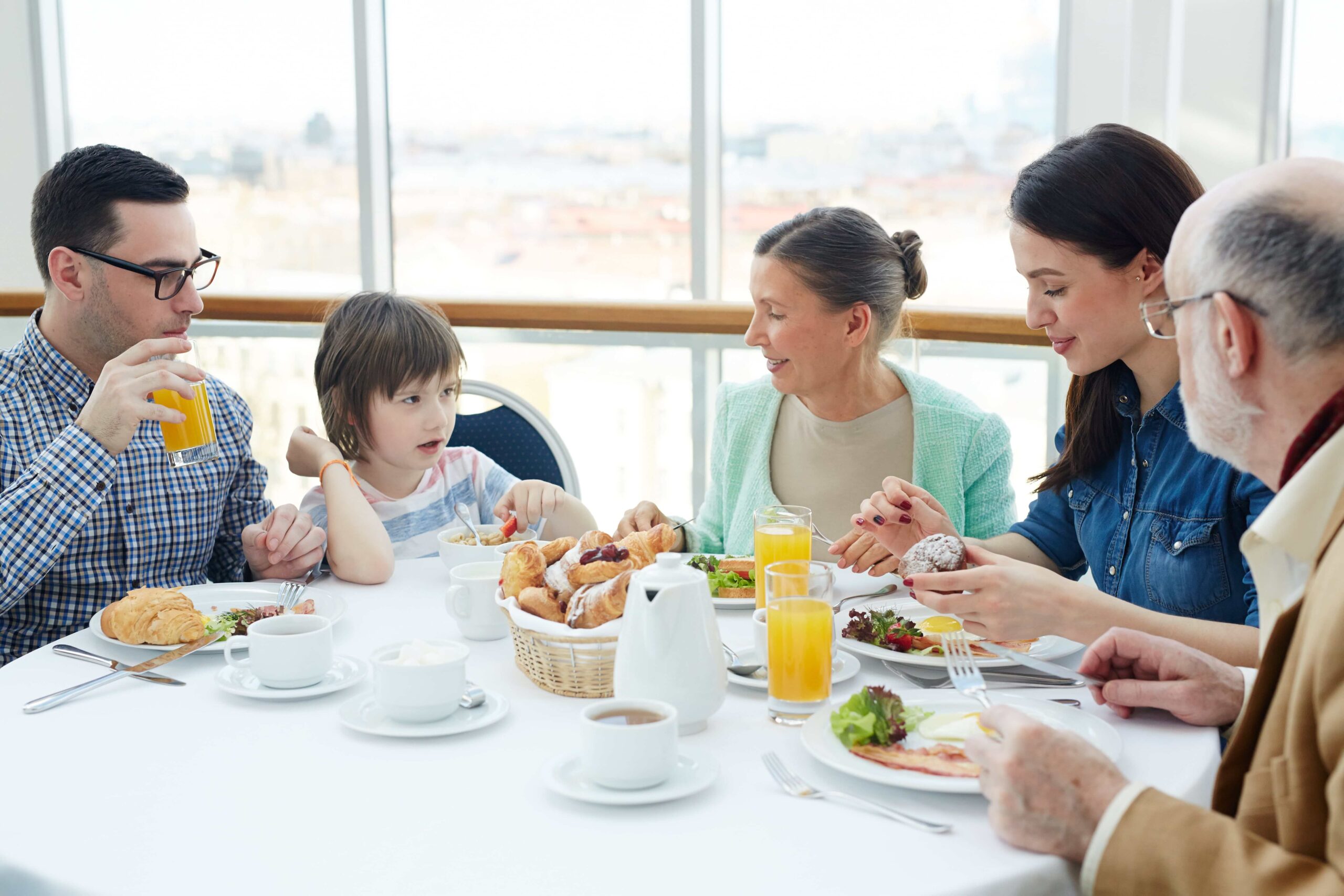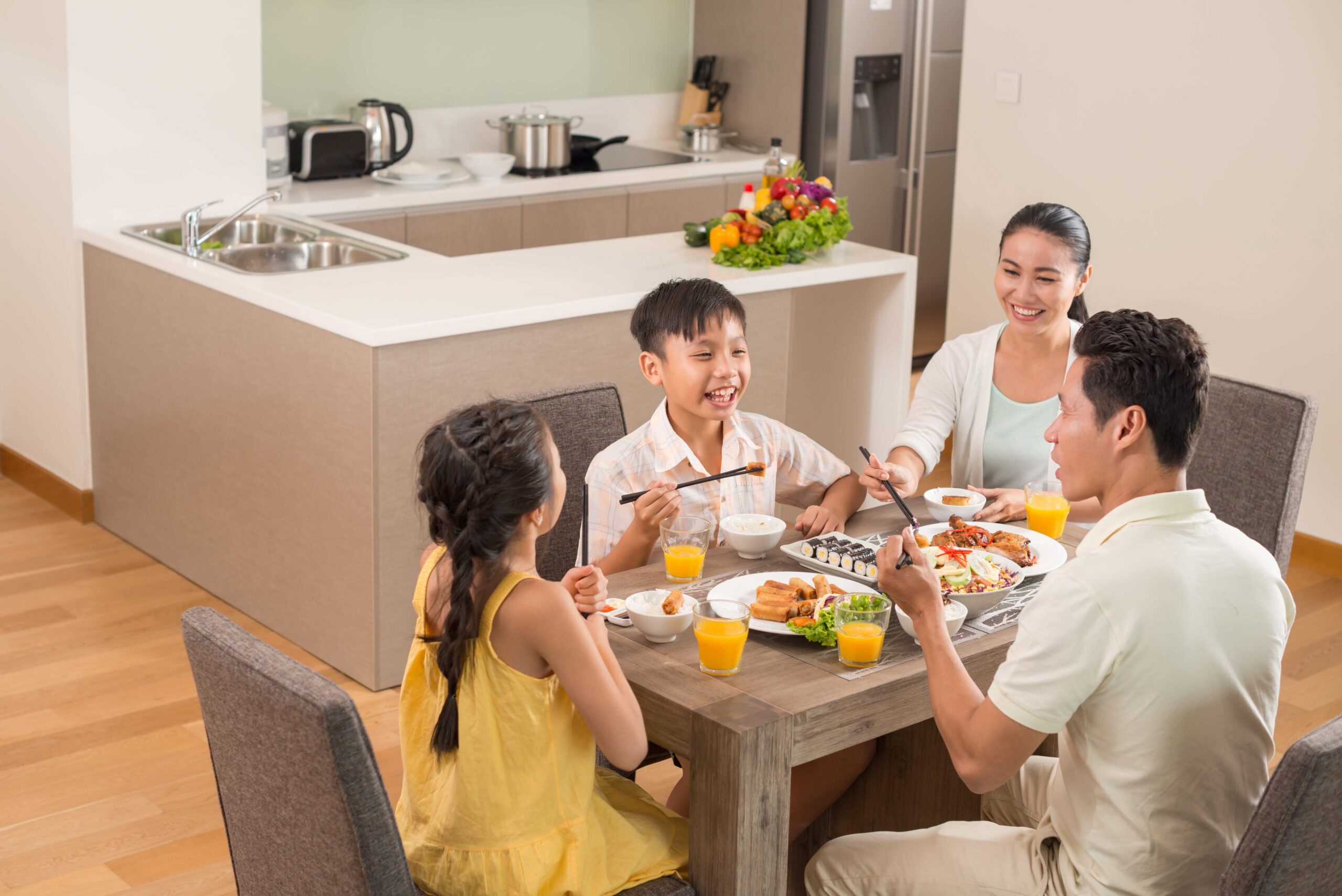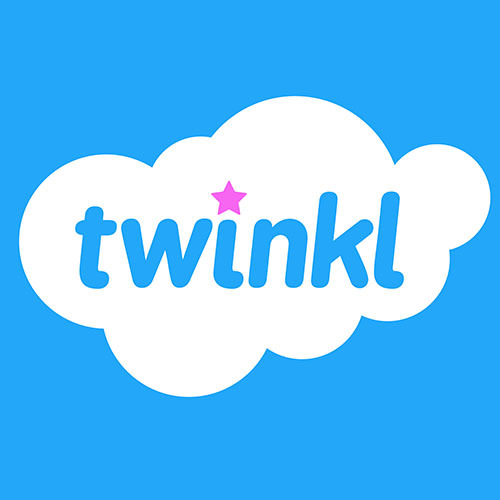Table talk refers to conversations between parents and their kids during mealtimes. According to research, talking together as a family has immense benefits for children, boosting their communication skills and emotional well-being.

Table talk refers to conversations between parents and their kids during mealtimes. According to research, talking together as a family has immense benefits for children, boosting their communication skills and emotional well-being.
 Anne Fishel, co-founder of The Family Dinner Project, professor at Harvard Medical School and the author of “Home for Dinner,” says that table talks are like “brain food,” nurturing children’s intellectual ability and physical health. Researchers from Harvard Graduate School of Education found that children having conversations during dinner time were more likely to learn difficult words than those who listened to read-aloud stories. Another study by the University of Michigan suggested that school-aged children spending regular mealtimes with families achieved higher academic results than those only studying in school or doing homework. When table talks with parents become a routine, this can create a reassuring foundation for children’s feelings of safety and security. Besides, some research also shows that dietary choices of children as young as five years old may impact subsequent nutrition practices and weight outcomes and long-term health. Therefore, having frequent family dinners together can help parents keep track of their children’s diets and encourage them to eat more healthily.
Anne Fishel, co-founder of The Family Dinner Project, professor at Harvard Medical School and the author of “Home for Dinner,” says that table talks are like “brain food,” nurturing children’s intellectual ability and physical health. Researchers from Harvard Graduate School of Education found that children having conversations during dinner time were more likely to learn difficult words than those who listened to read-aloud stories. Another study by the University of Michigan suggested that school-aged children spending regular mealtimes with families achieved higher academic results than those only studying in school or doing homework. When table talks with parents become a routine, this can create a reassuring foundation for children’s feelings of safety and security. Besides, some research also shows that dietary choices of children as young as five years old may impact subsequent nutrition practices and weight outcomes and long-term health. Therefore, having frequent family dinners together can help parents keep track of their children’s diets and encourage them to eat more healthily.
 Language skills
Language skillsDuring a table talk, children can learn how to converse with other family members. They can experiment with different words, phrases, and grammar structures while parents can correct and guide them to use the language properly. The conversational environment that a table talk creates will enrich children’s vocabulary and get them familiar with words used in daily-life situations, not just those they are taught in a more formal in-class setting. Moreover, the home atmosphere also helps your child to take time and choose proper words to converse. Children will also learn to listen and think critically by asking questions and explaining to their parents during mealtimes.
Conversational skills are not only established through verbal language but also non-verbal communication. This is why parents need to let their children practice table manners during mealtimes. Apart from basic gestures to express politeness and respect, for instance, not chewing and talking concurrently, keeping their surroundings clean while eating, children can also improve their eye-contact skills with table talks. Let your children understand that making eye contact will represent paying attention and help them learn how to value other people’s points of view during the conversations.

One of the greatest benefits of a table talk is that parents can have the opportunity to listen to their children’s stories about things they might not be comfortable sharing with their teachers or friends. Social-emotional skills including self-awareness, self-management and social awareness could be strongly established through frequent table talks. For instance, sensitive topics such as bullying, peer pressures, competitiveness in school, and difficulty making friends can be addressed if parents effectively direct these conversations with their children. Besides, listening to their parents’ advice will help children calm down and be emotionally assured, especially if they face a potential breakdown or anger. Also, children can build stronger self-esteem and empathy through meaningful conversations with their parents.
It is easy to fall into awkward silence or begin providing one-word replies when you and your kids are exhausted and hungry at the end of a busy day. “Have you had a good day?” “Yes.” “Can you tell me what you did?” “Nothing special.” So, how can you make table talks more engaging and beneficial for your child’s development?
 Start from the family roots
Start from the family rootsHaving conversations with your kids about the family’s heritage is always exciting to help your child bond with their origins and give them a different perspective in life. For example, you can start with questions such as “do you know where your grandparents’ hometown?”, “do you want to hear about games we play in our generation without Internet access?”, “do you know your grandparents’ jobs before they retired?”.
Food topics will never get old, and this could be a great conversation starter idea for your little kids. In addition to common questions such as “how is the food today?”, “what do you like to eat for tomorrow’s dinner?”, parents can take this chance to provide more knowledge about ingredients and nutrition. For instance, you can ask, “do you know what this dish is made from?” followed by explaining the ingredients and why their combination is good for your kids’ health. An additional activity is to let your kids write and design their own menu for the week, or you can suggest to them to help you prepare meals.
Parents have used storytelling across many other occasions, including bedtime, snack time, or separate reading hours. For mealtimes, you might not want to disrupt your kids’ digestion with books or comics around, but you can give them cues and encourage them to tell you their stories. These cues could be, for example, “I saw you got a new comic book last week, what is the plot?”, “How are you and your best friend? Did you guys do anything fun at school today?”, “If you wrote a book, what would it be about?”. Always remember to ask lots of open-ended questions, “how,” “why,”, “what,” to keep your conversations going.

Children will always be excited to talk about what they like, either sports, music, arts or games. Your conversation starter ideas should never miss the topic about their hobbies. However, instead of just asking what their interests are, you might dig into the conversation deeper and provide them with more relevant knowledge. For instance, if your kids like playing football, you can share how football was invented. If your kids are into music, you can introduce them to various genres or ask whether they will learn some musical instruments.
Creating opportunities where your child can openly discuss surrounding events and significant pieces of news will develop their social awareness. You do not need to make this topic dry and hard to digest. Pick the news that is relevant to your child’s interests and age range. Fuel your kids with good news stories such as a hero dog in town, someone is helping the sick elderly, or how people celebrate some significant international events such as Earth Day, Children’s Day, Christmas and other historical events. Do not fear discussing some bad news, but make it more comfortable for your child to digest. For example, if an earthquake or flood is happening in the country, you can let your child know about the impacts of these natural disasters and nurture their empathy for others.
Debates will not only help your kids practice critical thinking and persuasive skills but also enhance their confidence and public speaking ability. Bringing a fun and entertaining debating conversation to your dinner is a way to encourage your child to exchange their thoughts while stimulating themselves to explore a broader knowledge base. Some child-friendly topics you can choose for your table talks include “what are the pros and cons of having a pet?”, “Are zoos good for animals and why?”, “Can we replace teachers with computers?”, “Should smoking be banned?”.
E2 and Twinkl collaborated on articles in the E2xTwinkl series to give families a range of valuable information, activities, and ideas for following your children on their learning journey. The articles cover a variety of themes, like how kids learn STEAM and English efficiently at home. We believe you will start coming up with many wonderful ideas to help your children study well every day.
 Twinkl Educational Publishing is a British online educational publishing house producing teaching and educational materials. It is trusted by 11 million teachers, parents, and 12,000 schools in more than 200 countries worldwide. Twinkl has a collection of over 750,000 documents created by a team of international experts.
Twinkl Educational Publishing is a British online educational publishing house producing teaching and educational materials. It is trusted by 11 million teachers, parents, and 12,000 schools in more than 200 countries worldwide. Twinkl has a collection of over 750,000 documents created by a team of international experts.